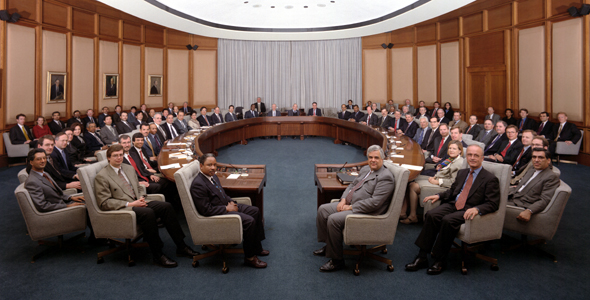Even though we may make the argument bitcoin is a poor store of wealth, as some have recently contested, could it simultaneously be a valid hedge against economic uncertainty?
Whether bitcoin makes a poor store of wealth or not (I will argue later bitcoin makes a considerable store of wealth), what if we could see investing in bitcoin as taking stake in a new, emerging digital economy? Perhaps this type of economic model is in itself a hedge against economic uncertainty precisely because it is a different form of law, which governs its use.
I see it now, the bitcoin spaceship hovering nearside the slowly but surely, sinking pirate-ship of the national economy. Have you purchased your ticket to the moon? Or perhaps the picture is not yet that optimistic ...
Denationalization of Money

-- The Executive Board of the International Monetary Fund, Washington, D.C. (April 19, 1999)
Characterizing this shift in the form of law governing money is what Friedrich Hayek would describe as the 'denationalization' of money, more specifically 'the normal provision of money would be entirely a function of private enterprise, the chief danger to its smooth working would still be interference by the state' in his Analysis of the Theory and Practice of Concurrent Currencies.
With bitcoin, this denationalization of provision over money has never been more apparent.

-- Friedrich Hayek, born May, 1899, Vienna, Austria-Hungary
"The chief danger, however, would threaten from renewed attempts by governments to control the international movements of currency and capital. It is a power which at present is the most serious threat not only to a working international economy but also to personal freedom; and it will remain a threat so long as governments have the physical power to enforce such controls."
And I will argue those 'physical powers to enforce' have now been lifted. Instead, we have in their place, enforcement powers which are defined by the laws of digital cyberspace. Geographical boundaries no longer exist, and therefore analog-money is a non-player, as are analog-actors who would attempt to control this “movement of currency and capital.”
If the function of managing money, and creating new currency is now denationalized, does that mean it then becomes a private function? I will argue still, no.
With a money system such as bitcoin, it cannot be claimed that either the management of the network nor the creation of new money comes strictly from private enterprise. Because the mining process involves the entire network in determining difficulty of the mining algorithm, and therefore, the effectiveness of mining-players to create new money, they are at the whim of every other player who is involved with that system.
In regard to the management of the system, security is a factor determined by every mining-player as well, with no determinism on the part of individual private enterprise.
Bitcoin as a Store of Wealth
Competition among a small pool of largely-used, competing currencies will bring about never-previously implemented possibilities in money systems. Antecedent patterns in competition among money will make for poor prediction tools around the long-term effects of such systems because money of the past has almost always competed within geographic and physical boundaries.
In money systems of today, there exists nowhere near as accurate measuring tools for credit supply as there exists in cryptocurrency economies governed by source-code. Floating money supplies of M1, M2, M3 (measures of various money stock in circulation) are a far-flung estimate in our economies of today. There exists too many hidden, and loose channels for credit expansion to accurately measure the availability of credit.
With bitcoin, we know for fact there will be 21 million units. We also know for fact how many new bitcoin will be released in the next 10 minutes. When you own 21BTC, you own 0.0001% of the bitcoin economy. We cannot dispute this, and because it is accurate and undeniable, it instills a perception of ownership in the mind of the consumer that constantly-expanding credit supplies never could. These more accurate measuring tools allow for the perception of credit, something that gives rise to agreement and adoption, to establish itself firmly in the mind of the consumer. Let your decisions be made unto your measuring tools, not the ambling movement of the crowd.
As one of the most common stores of wealth today, a comparison we recently made was bitcoin vs gold. It matters not that gold has been around for centuries (things can change, and they change quickly), but that gold has perceived scarcity and usefulness (albeit not enough to justify the price position tradition has built up).
Bitcoin as well has scarcity, but it has the measuring tools to prove it. Add on the fact that bitcoin is infinitely more portable and divisible than gold, and you have a case for supremacy.
If you own a rare comic book to which you know for truth to be 1 of only 4 ever to be in existence (and that comic book happens to be very, very useful), does the fact that there will only be 4 of them ever give the perception of something real rather than something in continual flux of availability?
Fractional reservation is certainly a possibility (and closing reality) in the bitcoin economy, yet it will exist adjacent to the main network, where total issuance of 21 million and rate of new issuance will be available immediately and transparently. Such a quick-moving market of competing currencies requires measuring points, which are not subject to national decision making. They also require management, which is beyond the private level.
I believe, almost as a universal law, that until our worldly physical resources are not in fixed supply, money must also be in fixed supply. As our availability of resources grows with global economic development and we garner the ability to use resources other than those accumulated on this single mote of dust we call Planet Earth, we will see the purchasing power of limited-supply money increase proportionately to the availability of these resources (assuming appropriate adoption). Steady deflation of such money would be almost entirely assured.
Conclusion
As a store of wealth, bitcoin may currently be volatile, but in an age where we are ever-approaching the denationalization of money, I daresay it is not only an excellent store of wealth, but a necessary consideration. Bitcoin as a hedge against economic uncertainty can exist simultaneously as an uncertain store of wealth. Even if bitcoin were to fizzle out spectacularly, the idea that it encompasses a radically new form of law which governs its use, is enough to consider a stake in it.
Did you enjoy this article? You may also be interested in reading these ones:
- Greece’s Varoufakis: Bitcoin Can Be Used in Eurozone ‘As Weapon Against Deflation’
- Grexit: Can the EU Survive It Without Hyperinflation?
- New EU Tax Law Could Double Tax Bitcoin and Log Location Data
